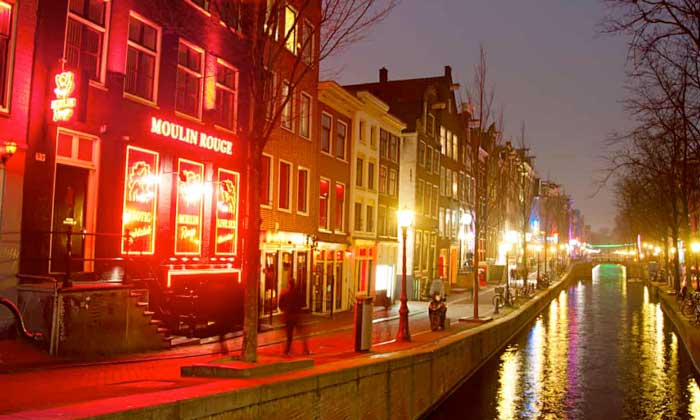Amsterdam wants to ban the sale of cannabis, stag parties and brothels in the Red light district.
Amsterdam is cracking down on nuisance tourism as the city looks to stop the sale of cannabis at weekends, limit stag parties, and shut down brothels across its infamous red light district.
The Dutch capital is wanting to reframe its global reputation for cheap and rowdy weekends away in favour of highlighting the gems of its cultural institutions.
For Amsterdam’s permanent residents, groups looking for blow-out weekends have caused havoc and annoyance throughout the city, with British tourists some of the most prevalent offenders.
The new plans for Amsterdam would allow locals to take back their city and clean up the low-grade tourism that it has long been famed for.
Amsterdam tells British sex and drugs tourists to stay away
Amsterdam is fighting back against foreign louts with an advertising campaign and new restrictions to stop tourists travelling there for drink, drugs and sex.
Next spring the city will begin a “discouragement campaign” to put off “nuisance” British tourists seen as the principal menace to peace and quiet on Amsterdam’s 17th and 18th century streets and canals.
Councillors said it would be a “targeted, digital discouragement campaign on foreign visitors who only come to Amsterdam for alcohol, drugs and sex”.
Councillors in the Dutch city say the move to discourage Brits from attending would be part of a “targeted, digital discouragement campaign on foreign visitors who only come to Amsterdam for alcohol, drugs and sex”.
The “stay away” campaign will focus on British tourists at first and, if this is successful, will be used to tackle to nuisance-causing groups from other countries, local broadcaster Noord Holland reported.
Sofyan Mbarki, the city’s deputy mayor who is in charge of the tourism measures, said: “The aim of the discouragement campaign is to keep out visitors that we do not want.
What is Cannabis
Cannabis, also known as marijuana among other names, is a psychoactive drug from the cannabis plant. Native to Central or South Asia, the cannabis plant has been used as a drug for both recreational and entheogenic purposes and in various traditional medicines for centuries. Tetrahydrocannabinol (THC) is the main psychoactive component of cannabis, which is one of the 483 known compounds in the plant, including at least 65 other cannabinoids, such as cannabidiol (CBD). Cannabis can be used by smoking, vaporizing, within food, or as an extract.
What Is The Red Light District In Amsterdam?
Named for the neon red lights that outline windows and doors where women in lingerie lounge provocatively and flirt with potential customers, the red light district is world renowned for its legal prostitution. Amsterdam has long been known for its open-minded policies toward pot and prostitution. But for the past several years, the largest city in the Netherlands has been trying to attract tourists interested in its many other offerings including picturesque canals, world-class museums, and wheels of cheese the size of tires. And the effort to tamp down on cannabis and sex tourism (AKA “party tourism”) has only intensified with the pandemic.
Is Red Light District legal in Amsterdam?
The women in the Red Light District sit or stand behind their windows from 8:00 am until 6:00 am. The industry has been legal in the Netherlands since 1811, and anyone over the age of 18 can legally become a prostitute as long as they pay their taxes and do not leave their windows.
Amsterdam Red Light District Etiquette
Before visiting Amsterdam it’s important that you are informed about the Red Light District etiquette rules that play an important role in De Wallen. Do you not want to come across as an annoying visitor, but as a decent guest? Then follow these 20 simple Red Light District etiquette rules.
- Do Not Take Pictures Of Prostitutes in Amsterdam
- Respect Sex Workers
- Don’t throw cig butts or joint-leftovers on the street or in the canals
- Nod To Sex Workers
- Don’t Be Noisy
- Bring Cash Money
- Negotiate Respectfully
- Walk On The Right Side
- Be Visible
- Cycle On Cycle Paths
- Always Bring Your ID
- Do Not Drink Alcohol Underaged
- Talk English (or Dutch) With The Locals
- Book At Restaurants
- Respect The House Rules
- Do Not Drink Alcohol in The Red Light District
- Do Not Violate The Minimum Age
- Ignore Street Dealers in Amsterdam
- Eat Something Before Smoking Weed
What is a stag party?
A stag party is what Brits call a bachelor party, which is a party thrown in celebration of the man about to get married. A stag night is usually planned by the groom’s friend or brother. Similarly, a hen do is a bachelorette party.
A stag night is usually planned by the groom’s friend or brother, occasionally with the assistance of a bachelor party planning company.
The first references to Western stag nights in the Oxford English Dictionary date to the 19th century. Traditionally, stag nights involved a black tie banquet hosted by the father of the groom that included a toast in honour of the groom and bride.
Since the 1980s, some bachelor parties in the United States have involved vacationing to a foreign destination, or have featured female company such as strippers or topless waitresses.
What Is Drug Tourism?
Drug tourism is when people travel to a select destination to buy or use drugs for any reason. These journeys can be for recreational or personal use and don’t even have to be a long trip. For example, people traveling from Kansas to Colorado to smoke marijuana would be participating in drug tourism. These drugs are usually illegal or unavailable in the traveler’s country or state, so they visit a well-known place like the Netherlands to obtain and use those substances. People worldwide understand where the popular destinations are, so they flock to those places in droves.
Recreational drug tourism is travel for the purpose of obtaining or using drugs for recreational use that are unavailable, illegal or very expensive in one’s home jurisdiction. A drug tourist may cross a national border to obtain a drug that is not sold in one’s home country, or to obtain an illegal drug that is more available in the visited destination. A drug tourist may also cross a sub-national border (from one province, county or state to another) to do the same, as in cannabis tourism, or purchase alcohol or tobacco more easily, or at a lower price due to tax laws or other regulations.
Drug tourism has many legal implications, and persons engaging in it sometimes risk prosecution for drug smuggling or other drug-related charges in their home jurisdictions or in the jurisdictions they are visiting, especially if they bring their purchases home rather than using them abroad. The act of traveling for the purpose of buying or using drugs is itself a criminal offense in some jurisdictions.
Also read :
- Best Free Sex Games You Can Play and Free Online Porn Game +18 only
- Sex Outside of Marriage is Considered a Crime in the Qatar World Cup!
- OnlyFans to soon ban sexually explicit content after pressure from bankers.
- Why Elon Musk Having Sex With Wife of Sergey Brin
- Best Online Porn Games ? What are the Top 10 Adult Sex Games?
- Tiwa Savage’s Real sex Tape LEAKED with boyfriend + video









